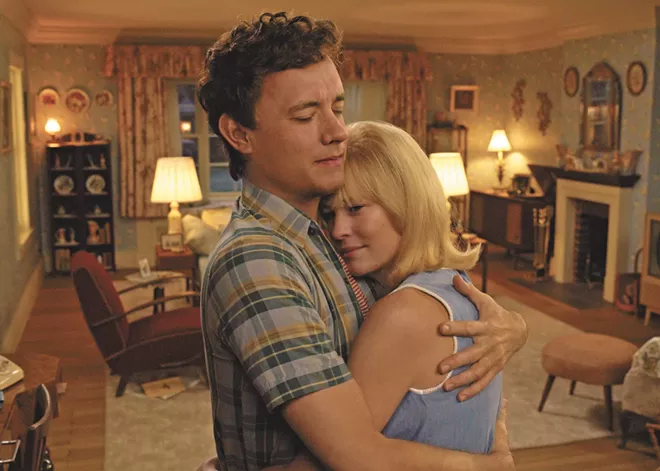There is a story about how Tom Hanks once fired actor and comedian Connor Ratliff from a small role in the HBO show Band of Brothers for having "dead eyes." It was something Ratliff turned into a podcast series that culminated in him speaking with Hanks himself. Though the Hollywood icon couldn't fully remember the firing, the two had a candid chat. One can only wish that Hanks, once concerned about even a small part having dead eyes, had the vision to see what a mawkish misfire of a film Here would be. He might have stopped the AI nightmare before it started. Instead, now the dead eyes are on the other face.
Here, from Forrest Gump director Robert Zemeckis, is a film that attempts to adapt the more ambitious graphic novel of the same name by Richard McGuire and loses all its subtle power in the process. It has the same framing device, placing us in one corner of the universe over thousands of years with the main focus being when it's a house, only to force it into a contrived, conventional story.
Where McGuire captured snapshots on a vast canvas that came together into something more unexpectedly profound, Zemeckis merely locks his camera down and makes the rest of the film superficially static along with it. Rather than thrive within the constraints as the graphic novel did, this adaptation just boxes itself in with its trite characters and a painfully cloying score.
At the center of this is Richard (Hanks), a talented artist who is only one of several to inhabit the Pennsylvania home. His mother, played by a committed Kelly Reilly (of Zemeckis' last good film Flight), and father, played by an out-of-his-depth Paul Bettany, both have their own struggles as neither ever seems happy with the path they've taken. Still, Richard soon falls in love with his high school girlfriend Margaret, played by the always reliable Robin Wright to complete the Forrest Gump reunion, and life begins to quickly unfold before the two AI approximations of teenagers. This takes the form of frames emerging into each other, at times gradually and at others forcefully, as we bounce around through time itself. The film looks in on lovers making inventions, families drifting apart, and the house repeatedly passing hands, leaving a sense that all of the decisions we make are ones that countless others have made before.
We come to see joy, pain, regret and loss crashing into each other even while remaining stuck in a singular place. It's an approach with real promise, even recalling something like the far superior film The Tree of Life at moments, but Zemeckis is so caught up in the technology of digital de-aging that too much feels stiff. Using AI-assisted technology in a failed attempt to make Hanks and Wright play their characters throughout the film from when they are teenagers onward, the filmmaker robs what should be emotional moments of any impact, reducing it all to feeling like a garish nightmare. Whenever they come in close to the camera or are meant to be emoting, it all takes a plunge so far down the uncanny valley it's remarkable the whole film doesn't go to pieces before our eyes. Even when Zemeckis eventually lets the actors be actors, freeing them of the layers of AI he hides them under, we see the multitude of other problems.
The changes made from the source material, the biggest surrounding a new family living in the present day and a general pulling back from the future, make sense on paper in order to focus the story, though leave much to be desired in execution. Where McGuire's sweeping story was more experimental, Zemeckis somehow makes his film both thematically didactic and emotionally underdeveloped. The ideas are there to be molded, though this is not the work with the dexterity to do so. It has such a fundamental lack of ambition that it can't ever consistently capitalize on the potential of the unique formal approach. Even as it's a film whose heart may be in the right place, there is just no getting past the dead eyes that betray Here's complete and utter lack of soul. ♦

